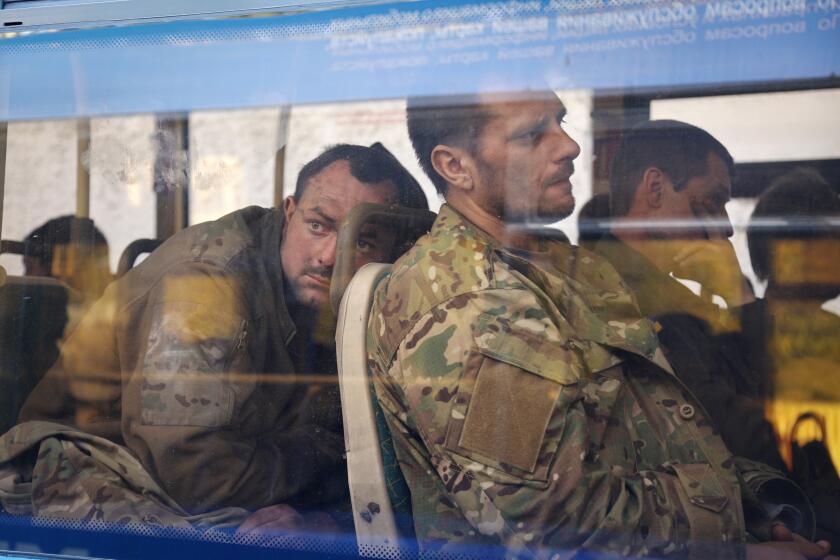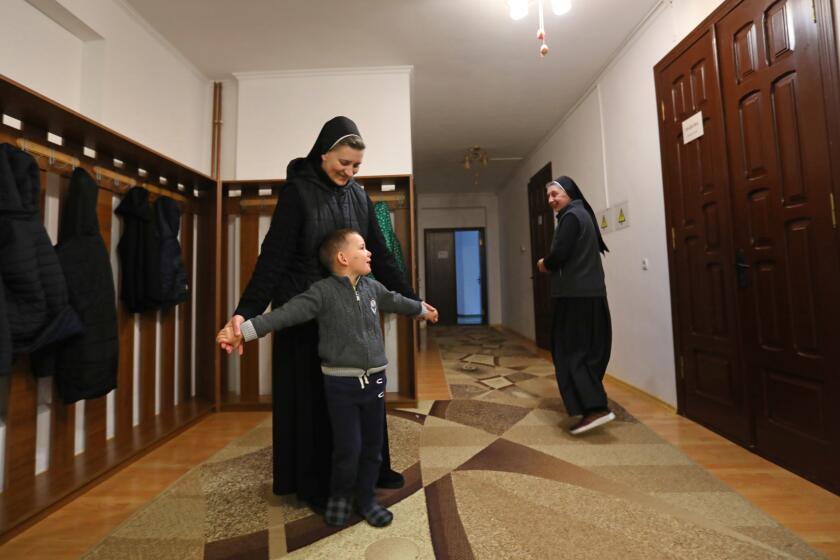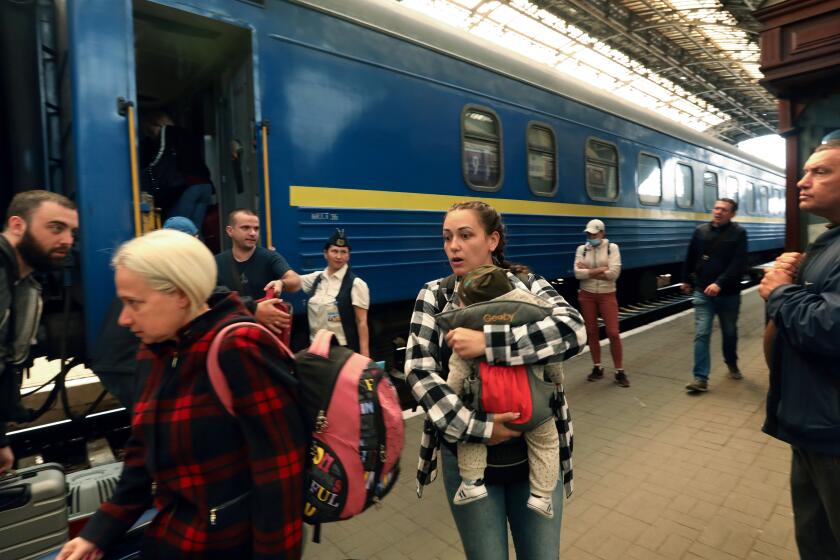U.S. to offer Sweden security guarantees as war in Ukraine enters a new phase
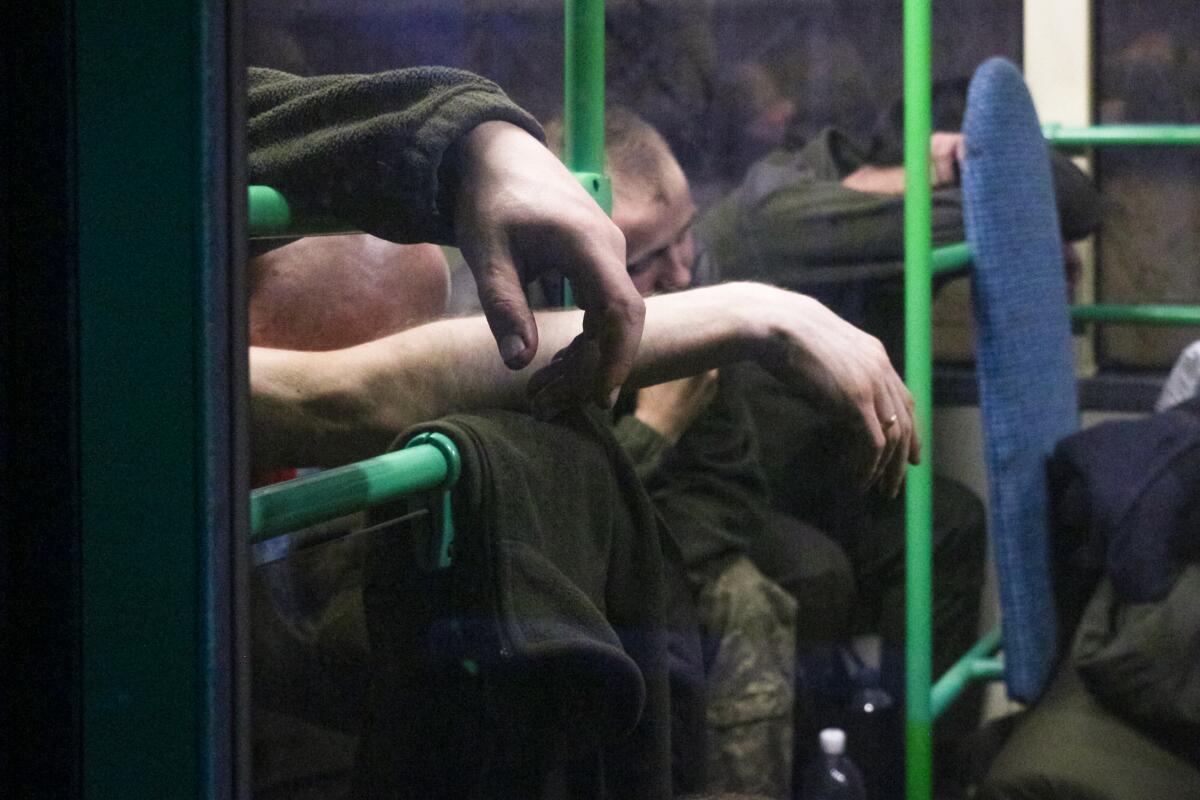
- Share via
KYIV, Ukraine — The first Russian soldier to be tried for war crimes pleaded guilty to killing a Ukrainian civilian on Wednesday as fears grew over the fate of hundreds of Ukrainian soldiers who surrendered at the Azovstal steelworks in Mariupol a day earlier.
Ukrainian officials said they are negotiating to exchange the beleaguered fighters for Russian prisoners of war. Russia’s parliament was expected to but did not take up a resolution Wednesday blocking the swap. Lawmakers had cited the Azov regiment, a militia with neo-Nazi roots that was absorbed into Ukraine’s military and which Moscow says still comprises Nazis.
Troops from the regiment held out in the steel plant for weeks in a last stand against a complete Russian takeover of Mariupol, in Ukraine’s southeast.
Their fate was left hanging even as 21-year-old Russian Sgt. Vadim Shyshimarin pleaded guilty in Kyiv in the fatal shooting of the unarmed civilian in the northeastern Sumy region on Feb. 28, four days after Russian forces swept into Ukraine. Shyshimarin, who could be sentenced to life in prison, shot the man in the head.
The trial is the first war crimes proceeding in Ukraine since the fighting began — and as Russian forces continue to strike military and civilian targets across the country. Ukraine’s prosecutor general has said that her office is preparing cases against 41 Russian troops accused of killing and raping civilians, bombing civilian infrastructure and looting.
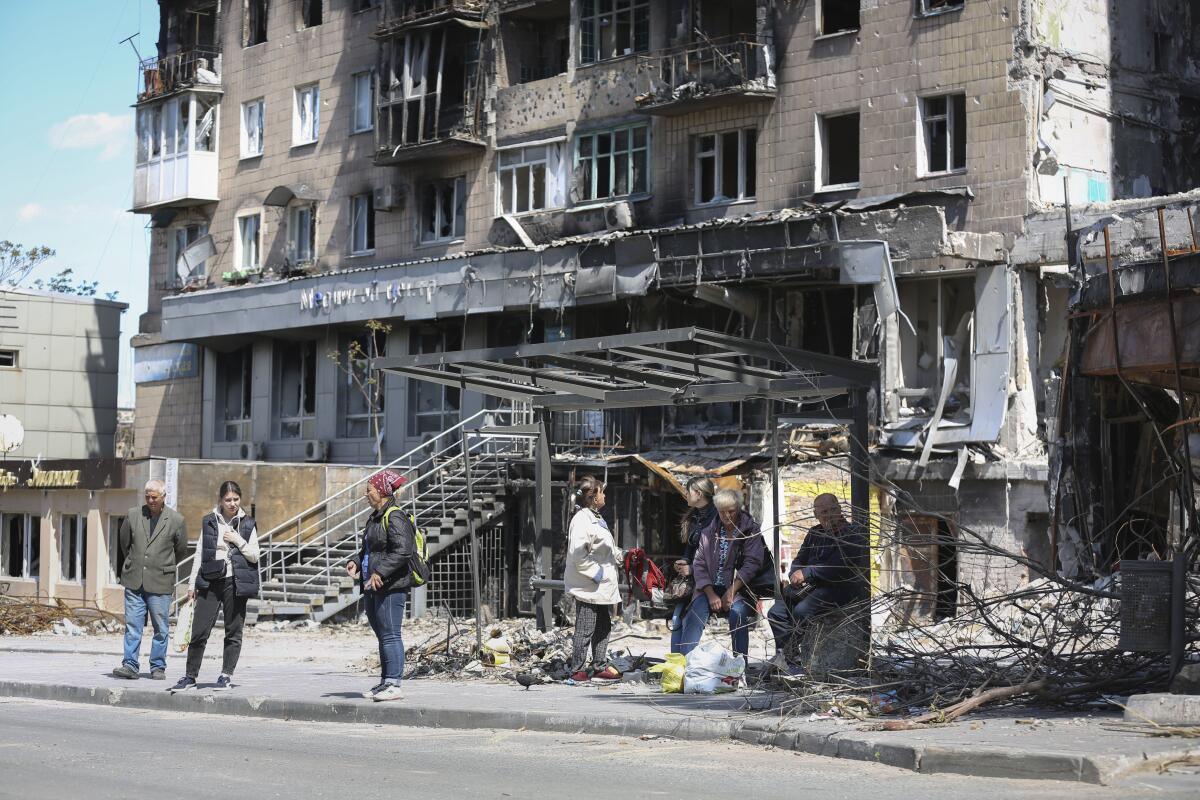
It was unclear whether Shyshimarin’s trial would affect negotiations over the Ukrainian fighters evacuated from Mariupol. But Russian lawmakers have spoken harshly of the Azov regiment.
“Nazi criminals should not be exchanged,” Vyacheslav Volodin, speaker of Russia’s lower house, the State Duma, said Tuesday about the Ukrainian prisoners, who are being held in a former penal colony in a Russian-controlled part of eastern Ukraine.
Investigators in the Kremlin have already indicated that they plan to interrogate the Ukrainian captives over alleged war crimes, and the country’s Supreme Court has been asked to label the Azov regiment a terrorist organization.
Russia scores its first major win with the takeover of the Ukrainian port city of Mariupol. But will it change the course of the war?
Ukraine’s deputy defense minister, Hanna Maliar, said talks were ongoing to exchange prisoners and evacuate an undisclosed number of Ukrainian fighters still inside the encircled steelworks. Russia said nearly 1,000 Ukrainian troops emerged from the Azovstal complex and handed themselves over this week, but Ukraine has declined to give figures.
President Volodymyr Zelensky has pleaded for patience, describing Ukraine’s pullout from Mariupol as a way to save the Azovstal defenders’ lives and the negotiations over them as requiring “delicacy and time.”
The uncertainty surrounding the Ukrainian fighters, many of whom were seriously injured, adds one more tense chapter to a battle that has become a focal point in the nearly 3-month-old war.
Russian forces were thwarted for weeks from capturing Mariupol, a key port city along the Sea of Azov, because of the stubborn defense mounted by the Azov regiment and other Ukrainian fighters inside the steel mill.
In a tranquil Ukrainian monastery, dozens driven from homes by war find refuge. The nuns say they will offer shelter as long as it’s needed.
Their resistance prevented Moscow from freeing up troops and other resources to fight elsewhere and “inflicted costly personnel losses amongst Russian forces,” Britain’s Defense Ministry said in a daily assessment Wednesday.
Though Moscow has now all but won the fight for Mariupol, its long siege has emerged as a symbol of the grinding road ahead for Russia’s military, which now seems resigned to a long-term fight.
“The war is entering a protracted phase,” Ukrainian Defense Minister Oleksii Reznikov told a meeting of the European Union Foreign Affairs Council on Tuesday. “We can already see how the Russian occupiers are beginning engineering and fortification works in the Kherson region [and in the southeastern city of] Zaporizhzhia in order to move to defense if necessary.”
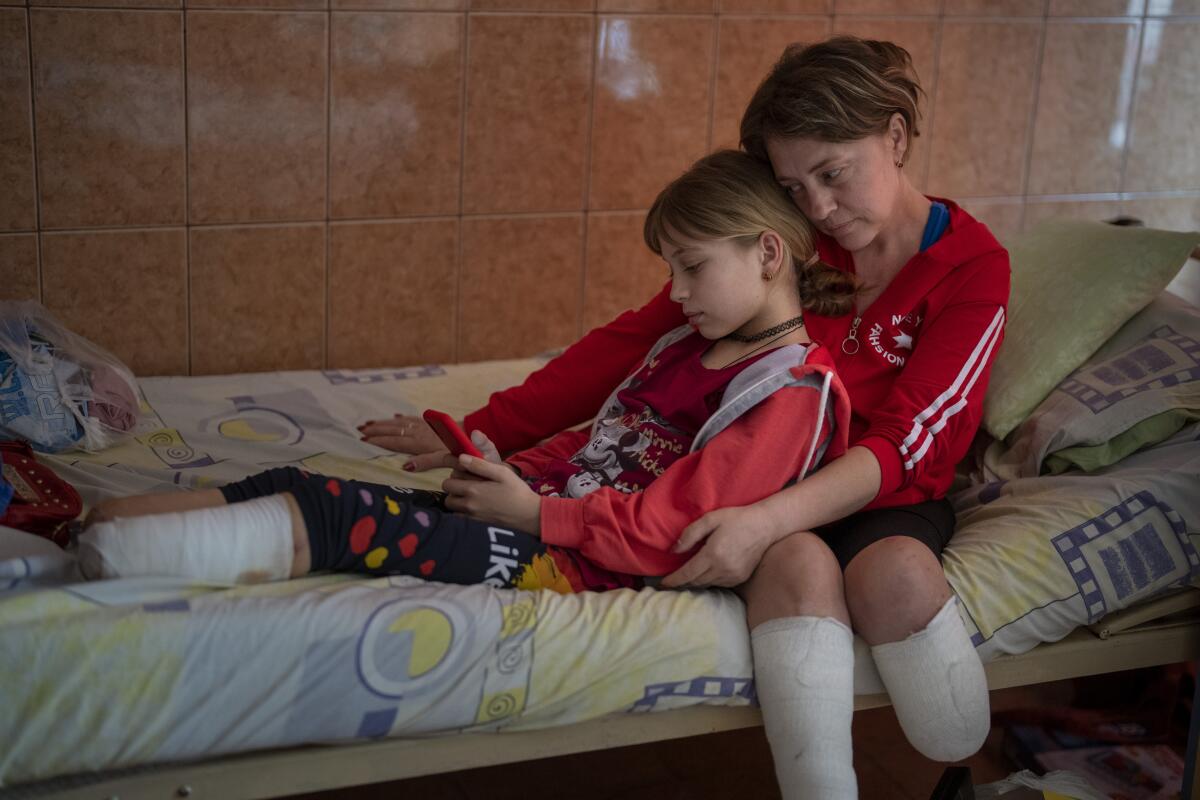
The longer the conflict lasts, however, the longer the Kremlin risks entrenching its isolation and galvanizing Western allies to join together.
That was manifested Wednesday when Finland and Sweden formally handed in their applications to join the North Atlantic Treaty Organization, reversing decades of military nonalignment.
U.S. Defense Secretary Lloyd J. Austin III welcomed his Swedish counterpart to the Pentagon the same day.
Austin and the Swedish minister, Peter Hultqvist, discussed the war in Ukraine and how to protect Sweden from Russia’s wrath over its NATO aspirations. Sweden and other nations are concerned Russian President Vladimir Putin would punish any country attempting to join NATO.
The U.S. is offering Sweden a number of unspecified security guarantees that could include money and weapons. The countries’ militaries have previously worked together in joint exercises.
“Being able to provide security assistance [to Sweden] would not be a major leap for us, not at all,” a senior Pentagon official said.
Austin’s remarks on the Sweden issue came as the U.S. officially reopened its embassy in Kyiv, Ukraine’s capital, pledging to “stand” with the Ukrainian people against Russian attacks.
Early in the war, the U.S. moved its diplomats to Lviv in western Ukraine, then to Poland. In the last week, those diplomats have begun returning to Kyiv, after embassies from other nations also reopened.
In a statement, U.S. Secretary of State Antony J. Blinken said the returning diplomats’ safety will be assured. Administration officials have declined to discuss details, including whether U.S. Marines will be deployed to guard the embassy, as they do in many countries.
Zelensky, meanwhile, said in his nightly address that Russia has fired more than 2,000 missiles in its attack on Ukraine. Those missiles make up a large part of Putin’s arsenal, he added.
The missiles mostly hit civilian infrastructure, Zelensky said, including the city of Mykolaiv in the south and Dnipro in central Ukraine in the last day.
Ukraine plans to restore its control over cities that are “under temporary occupation,” Zelensky said, such as Kherson, Melitopol, Berdyansk, Enerhodar and Mariupol.
Those communities “should know that Ukraine will return,” he said.
Breaking News
Get breaking news, investigations, analysis and more signature journalism from the Los Angeles Times in your inbox.
You may occasionally receive promotional content from the Los Angeles Times.
At least 3,752 civilians have been killed and 4,062 injured since Russia invaded Ukraine on Feb. 24, according to the United Nations, which says the actual casualty figures are considerably higher.
Many of those deaths are believed to be the result of war crimes, which will be examined by an unprecedented team of 42 investigators, forensic experts and other personnel from the International Criminal Court, the organization’s chief prosecutor, Karim Khan, said Tuesday.
“Now more than ever we need to show the law in action,” Khan said.
At least four more civilians were killed by Russian shelling Wednesday in the eastern region of Luhansk, according to Gov. Serhiy Haidai. One child was injured in the attack and was receiving treatment at an intensive care unit in Dnipro.
Relieved but anxious and fearful, passengers on a Ukrainian train describe the horrors of the Russian invasion and recount what they left behind.
Russia controls most of Luhansk — where pro-Russia separatists have declared their own republic — and has been pounding the remaining Ukrainian defenses in the region to break the stalemate, most recently with the aid of 15 helicopters deployed to the area.
The Ukrainian Defense Ministry said Wednesday morning that its forces had repelled 12 Russian attacks in the Donetsk and Luhansk regions in the previous 24 hours, destroying three enemy tanks, three artillery systems and six units of armored combat vehicles. The claim could not be independently verified.
Donetsk and Luhansk make up the Donbas, the eastern industrial heartland where Ukrainian and Russian forces have sparred since 2014.
McDonnell reported from Kyiv, Pierson from Singapore, Wilkinson from Washington and Parvini from Los Angeles.
More to Read
Sign up for Essential California
The most important California stories and recommendations in your inbox every morning.
You may occasionally receive promotional content from the Los Angeles Times.
